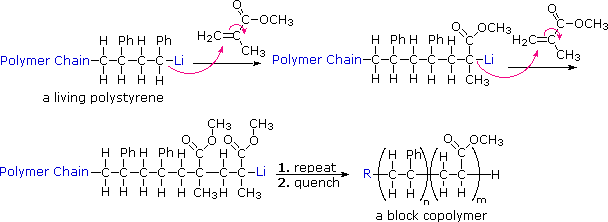Comprehending Polymers: The Science Behind Versatile Materials
Comprehending Polymers: The Science Behind Versatile Materials
Blog Article
Discovering the Varied Applications and Advantages of Polymers in Different Industries
Polymers, with their diverse series of residential or commercial properties and capabilities, have become important in different industries, each reaping one-of-a-kind take advantage of their application. Polymers. From improving safety and efficiency in the automotive industry to revolutionizing clinical gadgets in the health care industry, polymers play a crucial duty. Furthermore, their green nature is modifying the landscape of sustainability practices. As we look into the midsts of polymers in electronics, we uncover advanced innovations, while their architectural honesty changes the world of construction and facilities. The prevalent influence of polymers across sectors is a testament to their flexibility and flexibility, forming the future of many sectors.
Automotive Industry Applications
Polymers play a critical duty in boosting the efficiency and durability of numerous elements within the automobile market. These flexible products are extensively made use of in the production of various parts, varying from interior elements to under-the-hood applications. One noticeable use polymers in the vehicle market is in the production of light-weight components. By changing conventional steel components with polymer-based options, vehicles can accomplish enhanced gas efficiency without endangering on strength or safety and security.

Medical Care Sector Advantages
In various health care applications, the advantages of using polymers are commonly recognized for their diverse series of valuable residential properties. Polymers play a crucial function in the healthcare market due to their convenience, biocompatibility, and cost-effectiveness. One of the key benefits of polymers in healthcare is their capability to be customized to certain requirements, such as flexibility, toughness, and biodegradability, making them optimal for a large variety of clinical applications.
Polymer-based products are thoroughly utilized in medical tools, such as catheters, implants, prosthetics, and medication shipment systems, as a result of their biocompatibility and capability to imitate natural tissues. These materials can minimize the risk of allergic responses or rejections, boosting patient safety and security and results. Additionally, polymers are light-weight, making them ideal for wearable medical devices and making sure person convenience.
Moreover, polymers enable the development of cutting-edge therapy methods, such as hydrogels for tissue design and nanocomposites for targeted medication shipment. Their simplicity of handling and sterilization makes them essential for keeping high requirements of health in health care setups. Overall, the varied advantages of polymers contribute significantly to developments in medical technology and client treatment.
Environmental Benefits of Polymers

Furthermore, polymers can add to energy financial savings because of their light-weight nature. In markets such as transport, light-weight polymer products can help in reducing gas intake and greenhouse gas exhausts. In addition, polymers can make it possible for the development of energy-efficient products such as insulation materials that enhance power conservation in structures.
Additionally, polymers play a critical function in lowering water air pollution. For instance, using polymer-based filtering systems can efficiently eliminate pollutants and contaminants from wastewater, protecting water resources and environments. Generally, the environmental advantages of polymers make them valuable properties in advertising sustainability and eco-friendly techniques throughout different industries.
Polymers in Electronic Devices and Modern Technology
Thinking about the enhancing demand for cutting-edge and lasting services in modern-day markets, the integration of innovative polymer innovations in the realm of electronic devices and innovation has actually arised as a critical strategy for driving efficiency and hop over to here efficiency. Polymers have changed the electronics sector by allowing the manufacturing of lighter, much more adaptable, and resilient digital gadgets. From smartphones to medical tools, polymers play a crucial role in improving product design and performance.
One significant benefit of polymers in electronic devices is their protecting homes, which assist protect delicate electronic parts from ecological variables and electric interference. Furthermore, polymers are vital in the development of flexible screens, wearable innovation, and published electronic devices, using endless possibilities for developing smart and interconnected gadgets.
Furthermore, the usage of polymers in electronic packaging has resulted in improvements in miniaturization and thermal monitoring, boosting the general efficiency and reliability of electronic systems. As innovation remains to progress, the adaptability and adaptability of polymers will definitely drive additionally technology in the electronic devices industry, shaping the future of technology.
Role of Polymers in Building And Construction and Facilities
The combination of sophisticated polymer products in construction and facilities projects has actually transformed the means structures are developed and integrated in modern times. Polymers supply many benefits in the building sector because of their convenience, sturdiness, and cost-effectiveness. One essential duty of polymers in building is their use in finishes and sealers, providing security against ecological elements such as wetness, UV radiation, and rust. Continue Additionally, polymers are made use of in the production of lightweight and high-strength composite materials, enhancing the architectural integrity of structures while lowering general weight.
Furthermore, polymers play a vital role in sustainable building and construction practices by allowing the advancement of energy-efficient structures. Insulating products made from polymers aid control interior temperatures, reducing the need for heating and cooling systems and ultimately decreasing energy usage. Additionally, making use of polymer-based compounds in facilities tasks such as bridges and roadways enhances their durability and minimizes upkeep expenses. On the whole, the incorporation of polymers in building and facilities showcases their considerable effect on modern-day engineering practices.
Verdict
In final thought, polymers play a vital function in different industries such as automotive, health care, ecological, electronic devices, and building. Their versatile homes make them valuable in producing cutting-edge services and products. From boosting fuel effectiveness in vehicles to boosting medical tools, polymers provide many Home Page advantages. Additionally, their effect on reducing waste and promoting sustainability highlights their significance in contemporary applications. The prevalent usage of polymers shows their substantial contribution to progressing modern technology and improving lifestyle.
Report this page